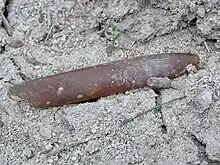Hibolithes
Hibolithes is a genus of belemnite that lived from the Middle Jurassic to the Early Cretaceous, and has been found in Antarctica,[1][2] Greenland,[3] Iran,[4] Europe,[5][6] South America, and New Zealand. In 2020, this genus was found in the Pedawan Formation (Tithonian – Hauterivian) in Sarawak, on the island of Borneo (Malaysia).[7]
| Hibolithes Temporal range: Middle Jurassic - Early Cretaceous | |
|---|---|
 | |
| Scientific classification | |
| Kingdom: | |
| Phylum: | |
| Class: | |
| (unranked): | |
| Order: | |
| Suborder: | Pachybelemnopseina Riegraf, 1998 |
| Family: | Mesohibolitidae Nerodenko, 1983 |
| Genus: | Hibolithes Montfort, 1808 |
| Species | |
| |
| Synonyms | |
| |
Species and sexual dimorphism
At least two Hibolithes species, H. conradi and H. semisulcatus, represented in Jurassic (Oxfordian and Tithonian) and possibly Early Cretaceous (Late Berriasian) zones of Hungary.[5]
H. shimanskyi, H. orlovi and H. ivanovi from Upper Callovian-Lower Oxfordian of Bryansk Oblast and Saratov Oblast of European Russia, were described in 1976 by Gustomesov. In 2006, Ippolitov assigned H. shimanskyi as a synonym to H. girardoti due to sexual dimorphism within this species. Ippolitov also assigned H. orlovi and H. ivanovi as synonyms to H. sangensis for the same reason.[6]
References
- M. R. A. Thomson. 1982. Late Jurassic fossils from Low Island, south Shetland Islands. Br. Antarct. Surv. Bull. (56)25-35
- J. Mutterlose. 1986. Upper Jurassic belemnites from the Orville Coast, Western Antarctica, and their palaeobiogeographical significance. Br. Antarct. Surv. Bull. (70)1-22
- P. Alsen and J. Mutterlose. 2009. The Early Cretaceous of north-east Greenland: a crossroads of belemnite migration. Palaeogeography, Palaeoclimatology, Palaeoecology 280:168-182
- N. Mariotti, R. Weis, M. Falahatgar, H. Parent, and M. Javidan. 2013. Oxfordian belemnites and ammonites from Rostam Kola, Northern East Alborz, North Iran. Boletín del Instituto de Fisiografía y Geología 83
- Istvan Főzy, Nico M.M. Janssen, Gregory D. Price. 2011. High-resolution ammonite, belemnite and stable isotope record from the most complete Upper Jurassic section of the Bakony Mts (Transdanubian Range, Hungary). Geologica Carpathica 62(5):413-433 DOI:10.2478/v10096-011-0030-y
- Ippolitov A.P. 2006. On the possible expression of sexual dimorphism in Hibolithes Montfort, 1808 from the Middle and Upper Jurassic of European Russia (in Rissian). Russian Acad. Sci., Paleont. Inst., Moscow, 8—10 November 2006. ISBN 5-201-15412-3
- Muhammad Murtaza, Abdul Hadi Bin Abd Rahman, Jörg Mutterlose, Najiatun Najla, Mazshurraiezal Bin Nasir. 2020. The First Record of Belemnite Genus Hibolithes from Late Jurassic – Early Cretaceous Turbidites from Malaysia. Acta Geologica Sinica 95(2) DOI:10.1111/1755-6724.14407
Further reading
- Fossils (Smithsonian Handbooks) by David Ward (Page 161)
- Combémorel R. & Mariotti M. 1986: Les bélemnites de la carrierede Serra San Quirico (Province d’Ancona, Apennin central, Italie)et la paléobiogéographie des bélemnites de la Téthys méditer-ranéenne au Tithonique inférieur. Géobios 19, 3, 299—321
External links
- Hibolithes in the Paleobiology Database
- Ippolitov A.P. 2006. On the possible expression of sexual dimorphism in Hibolithes Montfort, 1808 from the Middle and Upper Jurassic of European Russia (in Rissian). Russian Acad. Sci., Paleont. Inst., Moscow, 8—10 November 2006. ISBN 5-201-15412-3